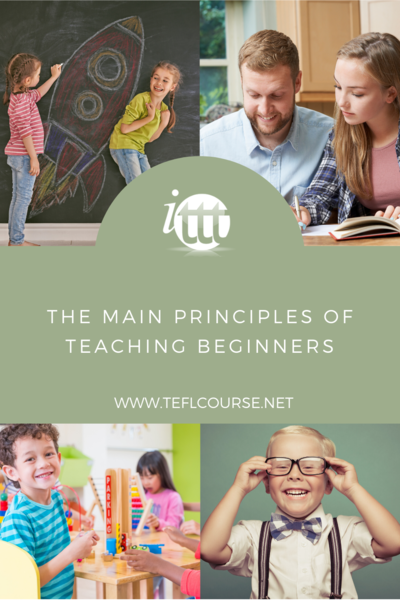The Main Principles of Teaching Beginners

Whom a student is defined within about same parameters by different sources. The Collins COBUILD Advanced Dictionary also has two definitions of the word student.
Table of Contents
Do you want to teach English abroad? Take a TEFL course!
- A person who is studying at an elementary school, secondary school, college, or university.
- A person who is interested in a particular subject and spends time learning about it.
The Merriam Webster dictionary (online) has two definitions of students which are as reproduced below:
- A person who attends a school, college, or a university.
- A person who studies something.
This post was written by our TEFL certification graduate PAUL D. Please note that this blog post might not necessarily represent the beliefs or opinions of ITTT.
The Basis of the Article
For this summative assignment, the second definition by the Merriam-Webster and Collins COBUILD Dictionary will be used. Using the second definition as just stated, a beginner student will be one who is new to the subject and is just beginning to start learning, and in this respect, learning English as a second language. Teaching beginner students is one daunting task because beginner students have very little or no iota of knowledge of the subject to be learned. Even for the most experienced teacher, it does not come cheap. And especially if there are several such new learners in a class.
They come with different learning abilities and with different motivations. Another challenge presents itself when students don't even belong to the same native language group. A good note to take when teaching beginner English students is to show them that your English lessons can be; fun and that they can perform well. It is important to get them engaged and positive about the classes. Tara Arntsen writing for Busyteacher.org drums the case of a fun class home by saying that students who are just beginning their English studies have no idea what to expect. And because of this, it is beneficial for their English teachers, current and later, to help them enjoy it by encouraging them and showing them that learning another language is not an overwhelming task.
Also Read: How long are TEFL contracts?
Useful Tips
Having discussed this, the question begs, "How should we teach beginner students of the English Language?" Six wonderful tips on teaching beginners are presented by Suzanne Bhagan in GoAbroad.com. These six tips are great tips to have a high level of success in teaching beginner students. The six tips are:
- Keep it simple, stupid.
- Always check for understanding.
- Give them lots of time to practice.
- The show, don't tell.
- Always use positive reinforcement.
- Don't be boring.
These six tips for teaching beginners re-echoes the earlier discussion on making classes interesting for beginning learners of the English Language. Many other writers have equally emphasized the need for active and interesting classes, not only for beginners but for existing learners. In my uncertificated experience as an ESL teacher, this has been a major contributor to keeping students who attended my English trial lessons and highly recommend. Any teacher of beginners should start with the very basics, alphabets, and numbers.
Also Read: Is it safe for single women to teach English abroad?
Program Core
The teacher can decide to teach the 26 alphabets of the English language divided proportionately alongside teaching numbers according to the abilities of the student. An ability to hear, read, say, write and identify the English alphabets is a great start for a complete beginner, the same should happen with numbers. In the process of teaching alphabets is to introduce with words that begin with the alphabets that are learned. Followed after alphabets and numbers are to teach pronunciation and especially of difficult sounds, which are particularly not common in the native language of the learners. This would require some research by the teacher.
Digraphs and diphthongs are such examples. L and R words are also very tricky. After these two, teaching the parts of speech starting with nouns with personal pronouns is a great idea. This can be followed by adjectives that tell more about nouns and then diving into the teaching of verbs with which students can begin to make simple sentences. With this basic gained, teaching adverbs would be wonderful along the journey of learning to use English as a second language.
Also Read: How to find a job teaching English in Latin America?
Verb tenses and articles should be thoroughly taught since the correct speech, spoken and written depends largely on verbs and tense. Students can now then be introduced to common phrases, learned by repetition with encouragement to use them as necessary. After the alphabet is taught with verbs and more, teaching students basic sentence construction should bring students up to communicating with a little fluency in basic English as they build on vocabulary. This is important, as it will provide a foundation for their writing ability. It will also aid them in reading. One writer adds that this could lead to teaching the main five patterns that sentences in English are constructed around:
- Subject-Verb sentences. For example, "The boy drinks"
- Subject-Verb-Object. For instance, "John eats pizza."
- Subject-Verb-Adjective sentences. "The cat is hairy."
- Subject-Verb-Adverb sentences. For instance, "The toy is here."
- Subject-Verb-Noun sentences. For instance, "Lilian is a teacher."
Do you want to teach English abroad? Take a TEFL course!
I cannot relate more with all that I have discussed above. Beginner students are tough to deal with but not impossible to build great skills for English into them. There have been beginner students who are now explicitly fluent listeners, speakers, readers and writers of the English language.
Apply now & get certified to teach english abroad!
Speak with an ITTT advisor today to put together your personal plan for teaching English abroad.
Send us an email or call us toll-free at 1-800-490-0531 to speak with an ITTT advisor today.
Related Articles:
- 10 Tips for Teaching Grammar to EFL Students Abroad
- Top 10 Things To Know When Moving Abroad To Teach English
- 4 Top Tips For Getting Your TEFL Certificate on the Road
- What TEFL course is most useful?
- What's Stopping You from Teaching English Abroad?
- The Best Countries to Teach ESL When You're 50+




